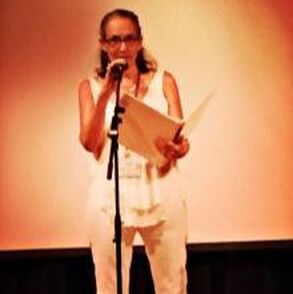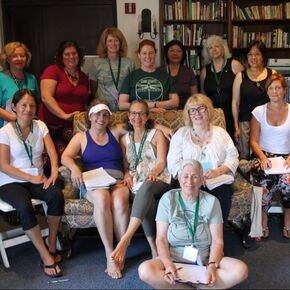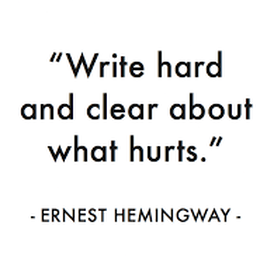 A few months ago, soon after I’d finished writing my memoir, Raw: A Midlife Quest for Health & Happiness, I had the opportunity to share five minutes of my work at a reading. While combing through my manuscript for excerpts, I found myself thinking, Hmm, maybe this writing isn’t as strong as I thought. The writing felt flabby and slow. I found myself tinkering with passages so they’d read better in a shorter timeframe, and wondered if that was okay. In past readings, I’ve mostly read my poems, complete works, each one featuring a beginning, middle, and end.
2 Comments
 Earlier this summer I made my annual trip to Claremont, CA, to teach my Write Where You Are Workshop at Camp Scripps, a four-day summer camp run by and for alumnae of Scripps College. I handed out three pages of prompts, lines gleaned from Nancy Levin’s poetry collection, Writing For My Life. A volunteer read them aloud and people circled the prompts they felt a visceral response to. Some of the most popular were:  “Life begins at the end of your comfort zone,” says author Neal Donald Walsch in Conversations with God, Book 3. Easy to say. Hard to do—especially when fear kicks in, which it does as you near the edges of your comfort zone. Writers are particularly susceptible. What happens when the thought of speaking in front of an audience fills you with dread? Or what if you’re afraid to fly and you need to travel for a book tour? Or what if your own writing is taking you down some dark alley and you’re sure you’re going to get mugged—or worse?  I wrote this post for my July monthly She Writes column. Have you ever heard the term AFOG? If you’re interested in creative writing and personal growth read on!  Two months ago, I touched upon journal writing in my post, “What To Do When You Feel Like You Can’t Write?” I alluded to the fact that basically, when life throws you a curve ball, one of the best things you can do is write in your journal. I spoke about how journal writing provides self-comfort and self-knowledge. I said it was your writer’s training ground, your therapist, and your best friend rolled into one. But journal writing is such an essential part of my writing life that I wanted to say more.  Recently, in my writing class, one of my students apologized because she’d spent her thirty minutes of writing time scribbling what she described as “nothing worth reading.” This woman is a wonderful poet, fiction writer, and English Department Chair at one of the most prestigious private schools in Los Angeles. Everyone in our class knew that although she felt “off” that night, chances were better than decent she’d written something worth listening to—despite her disclaimer that it was “just a bunch of selfish navel-gazing.”  Have you gotten up on the “wrong” side of the bed lately? If so, you know that how you wake up in the morning can set the tone for your entire day. Do you awaken to an alarm clock, jump out of bed, and feel rushed all day long? Do you feel like the day’s to-do list will take a week to complete? Does your life feel like a succession of endless striving and doing? If so, slowing down your morning wake-up process can make a difference in your day. Waking up slowly and deliberately—bringing awareness to this time of day—can help you maintain your equilibrium, which will make you calmer, and also more productive. Here are a few suggestions for bringing awareness into your mornings and starting your day with consciousness attention, clarity, and joy:  A couple weeks ago, using the voice memo function on my iPhone, I recorded pages of affirmations I’ve written over several years. I ended up with an hour and twenty minutes of recorded affirmations. I’ve been listening to them through headphones while falling asleep at night, and again early in the morning, during receptive theta brain wave states.  What’s the first thing you do when you get a headache? Or a stomachache? Or a kink in your neck? Do you head for the medicine cabinet? Pain remedies offer relief, but they don’t heal. Chronic conditions, as well as other health challenges, are your body’s way of trying to get your attention. A creative, holistic healing strategy is to give your pain, condition, or dis-ease a voice. |
Receive over 80 writing prompts from Where Do You Hang Your Hammock to ignite your creativity, gain clarity, and reach your personal and professional goals! You'll also receive my inspirational monthly blog/newsletter. |
“Where the spirit does not work with the hand there is no art.” —Leonardo da Vinci


